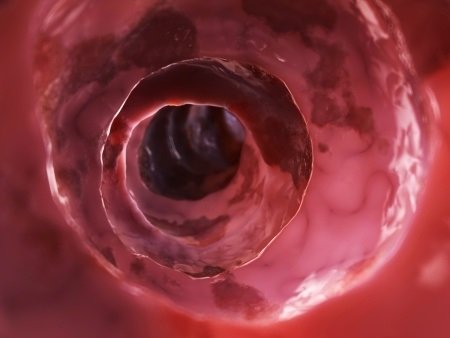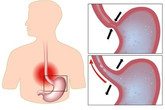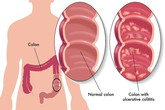Crohn's disease: symptoms, causes, diagnosis and treatment
Crohn's disease affects more than 1 million people in the US and every year thousands of others more are diagnosed with it. The disease was named by Doctor Burrill Crohn who documented and recognized it along with 2 of his colleagues in 1932.
Definition
Crohn's Disease is an IBD or inflammatory bowel disease that causes inflammation of your digestive tract's lining, eventually leading to malnutrition (in rare cases), severe diarrhea and abdominal pain. Depending on the individuals affected, the disease can involve various areas of the digestive tract.
When the inflammation occurs, it generally starts spreading deep into the layers of the affected bowel tissue. Crohn's disease can be both debilitating and painful and in some cases it may even be life threatening. Unfortunately, there are no known cures for Crohn's disease, yet there are many types of therapies that you can consider in order to reduce the symptoms and signs of the disease. If you undergo proper treatment, you can actually live a pretty normal life.
Symptoms
While in some people only the small intestine is affected, there are cases in which the colon is the one affected. The inflammation may spread through the fistula or the bowel wall, but it can also be confided to the bowel wall which may lead to stenosis or scarring.
When it comes to the symptoms and signs of the disease, they can be severe or mild and they can also develop suddenly (without warning) or gradually. This means that you may have extended periods of time with no symptoms or signs (remission). However, when the disease becomes active, you can experience:
- Weight loss and reduced appetite. The inflammatory reaction in the wall of your bowel, cramping and abdominal pain can affect not only your ability to absorb and digest food, but also your appetite.
- Ulcers. You may develop small sores on your intestine's surface which can turn into large ulcers that can even penetrate (in some cases) your intestinal walls. Ulcers may also appear in your mouth, being similar to canker sores.
- Blood in your stool. The bowel may bleed on its own or the inflamed tissue may bleed because of the food moving through the digestive tract. You may also experience bleeding that you won't notice in the toilet bowl, bleeding known as "occult blood".
- Cramping and abdominal pain. Portions of or the walls of your bowel may swell or even thicken with scar tissue because of the ulcerations and inflammations. Because of that, your normal bowel movement will undoubtedly be affected, leading to cramping and pain.
- Diarrhea. The cells in the intestine's affected areas will start secreting large amounts of salt and water because of the inflammation. Since the excess fluid cannot be fully absorbed by the colon, you'll get diarrhea.
Causes
A lot of research has been done about it, but researchers have yet to discover the exact cause of Crohn's disease. While in the past it was believed that stress and diet are the main culprits, researchers have changed their opinion about this. They now believe that factors such as a malfunctioning immune system and heredity play a vital role in the development of the disease.
- Heredity. Since the disease is mostly present in people who have family members with the disease, researchers believe that there are certain genes that make individuals susceptible to it. However the truth is that the majority of people affected by it don't really have a family history of Crohn's disease.
- Immune system. Crohn's disease may be triggered by a bacterium or virus. This means that when the immune system tries to fight off an invading microorganism, an abnormal response may occur, prompting the immune system to attack the cells in the digestive tract.
Tests and diagnosis
You will only be diagnosed by your doctor after he has ruled out other possible causes for your symptoms and signs, including colon cancer, diverticulitis and IBS. To help confirm a diagnosis for the disease, you may need to have one or even more of the following procedures and tests:
- Blood tests. Your doctor will firstly suggest that you do some blood tests so he can check for anemia, a condition in which the number of red blood cells in your system is low, thus limiting the amount of oxygen reaching your tissues; he may also use the blood tests in order to check for signs of infection.
- Barium enema. This diagnostic test will allow your doctor to use an X-ray to evaluate your large intestine. Prior to the test, you'll need to receive an enema with a contrast solution that contains barium. The lining of your bowel is dye coated by the barium, creating a silhouette of a portion of your small intestine that is visible on an X-ray, your colon and rectum.
- Small bowel imaging. This is a test that looks at the part of your small bowel which otherwise cannot be seen by undergoing colonoscopy. After you'll drink a solution containing barium, MRI, CT or X-Ray images of your small intestine will be taken. The test is very helpful with locating areas of inflammation or narrowing in the small bowel which are characteristics of Crohn's disease.
- Fecal occult blood test. In order for your doctor to test for blood in your stool, you may need to provide a stool sample.
- Colonoscopy. Using a lighted, flexible and thin tube with an attached camera, your doctor can easily view your entire colon this way. During the procedure, he may also choose to perform a biopsy (taking small tissue samples) for laboratory analysis in order to help with confirming the diagnosis.
- Magnetic resonance imaging. In order to create detailed images of tissues and organs, an MRI scanner uses radio waves and magnetic fields to accomplish that. What makes this test such a preferred choice by patients is the fact that they are not exposed to radiation and it's also very helpful in diagnosing Crohn's disease.
Treatments and drugs
Currently, there are no cures for Crohn's disease, yet there are treatments and various types of therapies that can yield good results. Anti-inflammatory drugs are generally the first step in the treatment of Crohn's disease and they include:
- Corticosteroids. While they're really helpful for reducing inflammation anywhere in the body, they do have side effects, with some of them including hyperactivity, insomnia, night sweats, excessive facial hair and a puffy face.
- Mesalamine (Rowasa, Asacol). Compared to other treatment options, such as sulfasalazine, Mesalamine is less likely to cause side effects, yet when it does they can include headaches, diarrhea, heartburn, vomiting and nausea. One thing to keep in mind is that this type of medication is ineffective for diseases involving the small intestine.
- Sulfasalazine (Azulfidine). This drug may help some people whose colon is affected, yet it's not always effective for treating Crohn's disease. It also has several side effects, including headache, heartburn, vomiting and nausea. If you're allergic to sulfa medications, it's recommended you don't take Sulfasalazine.
Crohn's disease can be a very life impacting disease, causing severe pain that can sometimes be debilitating. If you want to manage it properly and live a life as close as possible to normal, then you should visit your doctor right away and decide on a treatment plan. The sooner you do so, the sooner you'll start feeling better and return to your regular activities.
| Written by: | Michal Vilímovský (EN) |
|---|---|
| Education: | Physician |
| Published: | November 24, 2013 at 5:40 AM |
| Next scheduled update: | November 24, 2015 at 5:40 AM |
Related articles
Get more articles like this in your inbox
Sign up for our daily mail and get the best evidence based health, nutrition and beauty articles on the web.








Ache in left arm that you should not ignore
Alkaline water dangers: why you should not drink it
How to Avoid Sleepiness While Studying?
23 Foods That Increase Leptin Sensitivity
Low dopamine (e.g. dopamine deficiency): causes, symptoms, diagnosis and treatment options
Swollen taste buds: the ultimate guide to causes, symptoms and treatment
Thin endometrial lining: causes, symptoms, diagnosis and treatment
Pimples inside nose: the complete guide
Holes in tonsils: definition, symptoms, treatment and prevention
How to deal with an ingrown hair cyst
Allegra vs. Zyrtec vs. Claritin
How to get rid of phlegm (excessive mucus) in throat? Detailed guide to medical and home remedies, symptoms and causes
What causes stomach ache after meals?
Allergy to penicillin and alternative antibiotics
Liver blood test results explained